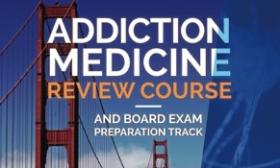
Substance Use in Pregnancy (2017) | Mishka Terplan, MD
This presentation is part of the Addiction Medicine Review Course 2017, an overview of the core elements of addiction medicine, presented by top experts in the field. Together with the other presentation it can serve as a broad review for clinicians, a review of the basics for newcomers, or a starting point for those preparing to sit for the Board of Addiction Exam.
Target Audience
- Addiction medicine specialists who want an overview of the latest developments in the field and their relevance to clinical practice
- Primary care clinicians who want to get a better understanding of addiction and manage patients with addictions in their practice
- Public health officials who want an understanding of the current state of addiction treatment
- Non-physicians who are involved in the treatment of addiction
Learning Objectives
As a result of participating in this lecture learners should have a working knowledge of the following topics, essential to competency in addiction medicine and identify areas where more study may be needed:
- Epidemiology of alcoholism and addiction in women (including tobacco)
- Overview of screening tools designed for this population (standardized questionnaires, best if a copy could be in an appendix),
- Overview of office-based brief interventions with pregnant patients and new moms,
- Changes in drug dosing/volume of distribution or metabolism during pregnancy
- Effects on the fetus of mode of maternal drug use (oral, intravenous, intranasal, inhalation, IM) and type of drug used
- Obstetrical complications and pregnancy-related disorders and complications involving alcohol, tobacco and drugs (preterm, SABO, ID, nutrition, routine medical care etc)
- Routes of fetal/neonatal exposure to alcohol, tobacco and drugs (placenta/nursing/second hand), fetal/perinatal effects of such exposure and if there are peaks of vulnerability (neurological/physical/ cognitive)
- Pharmacologic and non-pharmacologic intervention for neonatal intoxication and withdrawal for opioids and sedatives,
- Clinical management of the alcoholic/addicted/smoking pregnant patient (evidence-based, pharmacologic, residential, etc),
- Include any comments on treatment modalities that work better or worse on this population or are contraindicated and why,
- FAS, cognitive and behavioral diagnoses secondary to in-utero alcohol and drug exposure.*
- Management of adverse impact of alcohol on the fetus,
- Ethical/legal/liability considerations.
- Briefly describe the design, outcome, limitations and clinical implications of the MOTHERS Study.
*Anatomic characteristics of FAS will not be presented in Alcohol talk so it should be covered here.

Mishka Terplan, MD
Dr. Terplan is board certified in both obstetrics and gynecology and in addiction medicine. His clinical, research and advocacy interests lie along the intersection of reproductive and behavioral health. He is currently Professor in both Obstetrics and Gynecology and Psychiatry and the Associate Director of Addiction Medicine at Virginia Commonwealth University in Richmond VA as well as the Addiction Medicine Consultant for Virginia Medicaid.
Disclosure
Dr. Terplan has no relevant financial relationships
The California Society of Addiction Medicine (CSAM) is accredited by the Institute for Medical Quality/California Medical Association to provide continuing medical education for physicians. CSAM takes responsibility for the content, quality and scientific integrity of this CME activity.
CSAM designates this edduring internet-based educational activity for a maximum of 1 AMA PRA Category 1 Credits™. Physicians should only claim credit commensurate with the extent of their participation in the activity.
This credit may also be applied to the CMA Certification in Continuing Medical Education.
Available Credit
- 1.00 AMA Category 1
- 1.00 Attendance

 Facebook
Facebook X
X LinkedIn
LinkedIn Forward
Forward